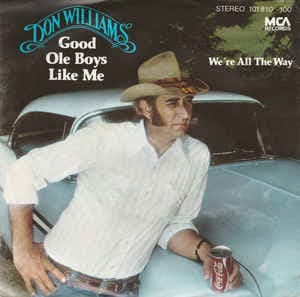
That Soft Southern Wind Still Blows: A Story of Roots and Reckoning
There are songs that simply drift through the radio waves, and then there are those that settle deep in the soil of your soul, becoming a permanent part of the landscape. Don Williams‘ 1980 masterpiece, “Good Ole Boys Like Me,” is firmly in the latter category. It’s a beautifully layered narrative, written by the masterful Bob McDill, that wrestles with the complex, often contradictory, legacy of the American South and how those roots irrevocably shape the men who grow up there. Released in March 1980 as the second single from his Portrait album, the song ascended to the peak of the country charts, reaching a respectable Number 2 on the Billboard Hot Country Singles & Tracks chart and Number 3 on the Canadian RPM Country Tracks.
What makes this track resonate so profoundly, particularly with those of us who have lived a few decades, isn’t just the late, great “Gentle Giant’s” warm, reassuring baritone, but the naked honesty of McDill’s lyricism. It’s a poignant recollection of a Southern childhood—a world steeped in both the sacred and the profane. We remember the opening verse, a flawless distillation of a particular upbringing: “When I was a kid Uncle Remus he put me to bed / With a picture of Stonewall Jackson above my head.” That juxtaposition—the folklore, the historical reverence—is immediately complicated by the figure of the father: “Then daddy came in to kiss his little man / With gin on his breath and a Bible in his hand.” The song doesn’t judge; it merely observes, painting a picture of a heritage filled with love, security, faith, and undeniable human imperfection.
This is the central story of “Good Ole Boys Like Me”: the wrestling match between a man’s background and his desire to forge his own path. It’s the conflict of recognizing the flaws in the culture you were raised in—those “good ole boys” with their hardened edges and simple, sometimes narrow, ways—while still feeling an unbreakable bond to that place and those people. Williams sings about getting educated and traveling far away, perhaps hoping to escape or transcend that upbringing, only to find the essence of his beginnings etched onto his spirit. The line, “And those Williams boys they still mean a lot to me / Hank and Tennessee,” is a brilliant piece of lyrical wit, a nod to both the country music legend, Hank Williams, and the renowned playwright, Tennessee Williams. It suggests a broader, more artistic and questioning Southern identity than the rigid, conservative one he grew up with.
The overall feeling is one of quiet, nostalgic acceptance. The adult reflecting on the child realizes that the past isn’t just prologue; it’s an active ingredient in the present self. The song concludes not with an answer or a resolution, but with a question that hangs in the air like Spanish moss on a live oak tree: “I guess we’re all gonna be what we’re gonna be / So what do you do with good ole boys like me?” It’s a humble, heart-stirring acknowledgment that a man’s story is never truly finished, and that, no matter the journey, you can “still hear the soft southern winds in the live oak trees” whispering the immutable truth of where you come from. It’s a timeless ballad that, much like the gentle soul who sang it, offers comfort and profound insight in equal measure.